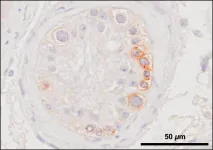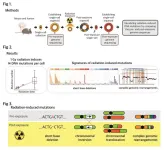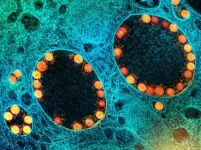(Press-News.org) Discovery of a pair of genes that work in perfect harmony to protect male fertility, could provide new insights into some unexplained cases of the most severe form of infertility, research suggests.
Genetic analysis of cases of male infertility revealed that rare mutations in a gene, known as SPOCD1, disrupts the formation of healthy sperm during the earliest stages of their development.
The gene was also found to work in partnership with a previously unknown gene, C19orf84, to protect the early-stage precursors to sperm, known as germ cells, from damage.
The discovery of the essential role of these two key genes could provide the answer to some cases of the most severe forms of male infertility and lead to expanded genetic screening for rare mutations, researchers say.
Cryptozoospermia and azoospermia, in which little or no sperm is produced, affects around 1% of men. In 45% of cases no cause can be found, but they are long suspected of having genetic causes.
Sperm cells biggest challenge starts long before the journey to reach the egg as they are particularly vulnerable during the earliest stages of their development, as germ cells in developing embryos.
Germ cells must protect their DNA from damage during the embryo’s development so they can become the pool of self-renewing cells that produce healthy sperm throughout adult life.
A previous study by the researchers had shown that SPOCD1 has an essential role in protecting germ cells in male mice, but it was unclear whether the same process happened in humans.
In collaboration with researchers at the University of Münster and other partner universities, scientists at the University of Edinburgh screened international databases containing genetic data from 2913 men involved in studies on infertility.
They identified three men who carried faulty versions of the SPOCD1 gene which resulted in damage to germ cells that prevented healthy sperm development – this failure to launch led to infertility.
During their development, germ cells undergo a reprogramming process that leaves them vulnerable to rogue genes, known as jumping genes, which can damage their DNA and threaten fertility.
Germ cells are the vital link between generations but they need unique strategies to protect the genetic information they carry, so it can be passed successfully from parents to their offspring.
The previous study in mice found that the SPOCD1 gene helps to recruit protective chemical tags, known as DNA methylations, to disable jumping genes.
This study revealed that the men with faulty versions of the SPOCD1 gene had the most severe forms of infertility, azoospermia and cryptozoospermia.
Analysis of the mutated variants of the SPOCD1 gene also revealed a new gene, known as C19orf84 which partners with SPOCD1 and forms an important line of defence in early sperm cells.
Further study of the role of these genes in early-stage sperm cells in mouse embryos revealed that both produce proteins are essential in recruiting the protective tags that silence jumping genes.
Scientists have long puzzled over how germ cells escape damage during the reprogramming process, as it temporarily wipes their genetic slate clean of existing protective tags.
C19orf84 protein acts as a matchmaker connecting the SPOCD1 protein with the cell’s protective chemical tag-making machinery and directing them towards the jumping genes before they can damage the genome.
Increased understanding of this process together with expanded genetic screening will allow scientists to identify if faulty versions of these genes are the cause of some of these rare cases of male infertility, researchers say.
The study, published in Molecular Cell, was funded by Wellcome. It also involved researchers from University of Oxford, University Hospital Münster, The University of Melbourne, Oregon Health and Science University, University of Utah and Technische Universität Berlin.
Professor Dónal O'Carroll, lead author of the study from the University of Edinburgh, said:
“This was a wonderful collaborative project that led to the discovery of new genetic causes of male infertility. We also advanced our understanding of a process that is fundamental to healthy sperm cell development. These mechanistic insights are leading to a better understanding of the elusive process that allows developing sperm to preserve their genetic integrity and escape an early death.”
Dr Ansgar Zoch, first and co-corresponding author of the study from the University of Edinburgh, said:
"A truly collaborative achievement, this study enhances our understanding of male infertility on the molecular and genetic level. I am particularly proud that so many co-authors joined efforts and contributed their expertise. We demonstrate strong evidence for SPOCD1 to be included in genetic screenings of male infertility patients. Providing a genetic diagnosis can help provide closure to affected individuals and potentially prevent unnecessary medical procedures.”
ENDS
END
Male fertility gene discovery reveals path to success for sperm
The discovery of a pair of genes that work in perfect harmony to protect male fertility, could provide new insights into some unexplained cases of the most severe form of infertility, research suggests
2024-02-14
ELSE PRESS RELEASES FROM THIS DATE:
Genome sequencing unveils mutational impacts of radiation on mammalian cells
2024-02-14
Recent release of the waste water from Japan's Fukushima nuclear disaster stirred apprehension regarding the health implications of radiation exposure. Classified as a Group 1 carcinogen, ionizing radiation has long been associated with various cancers and genetic disorders, as evidenced by survivors and descendants of atomic bombings and the Chernobyl disaster. Despite much smaller amount, we remain consistently exposed to low levels of radiation in everyday life and medical procedures.
Radiation, whether in the form of high-energy particles or electromagnetic waves, is conventionally known to break our cellular DNA, leading to cancer ...
WashU awarded up to $20 million to create portable device to scan for eye diseases
2024-02-14
In the United States, more than one-fourth of adults over age 40 have an eye disease, including glaucoma, cataracts or age-related macular degeneration, or a chronic health condition that affects the eyes, such as diabetic retinopathy. These conditions are a strain on an individual’s health as well as on the health-care system, yet early diagnosis and management can help to prevent more than 90% of severe vision loss.
Chao Zhou, a professor of biomedical engineering in the McKelvey School of Engineering at Washington University in St. Louis, has been working to improve optical coherence tomography (OCT) systems that can conduct high-resolution imaging of the ...
New understanding of avian eggshell attachment – implications for medical procedures and egg industry
2024-02-14
Athletes often suffer injuries to ligaments in their knees, particularly to the anterior cruciate ligament or ACL. While surgery to replace these torn ligaments is becoming increasingly common around the world it often needs to be repeated. That’s because it has proved challenging to anchor fibrous, soft and wet ligament grafting material into hard bone.
Now, McGill University researchers have new information from the eggshell membrane in chicken eggs that could help change this picture thanks to the potential it offers for improvements in tissue engineering ...
HHMI opens National Competition for Freeman Hrabowski Scholars Program
2024-02-14
Today, the Howard Hughes Medical Institute (HHMI) opened a national competition to select up to 30 early career faculty in science to join the 2025 cohort of the Freeman Hrabowski Scholars Program.
Freeman Hrabowski Scholars are outstanding basic researchers, including physician-scientists, who have strong potential to become leaders in their fields. Scholars are committed to advancing diversity, equity, and inclusion through their mentoring efforts and understanding of systemic exclusion and marginalization in science of trainees from different backgrounds. While pursuing excellence in their own research, Scholars work to create an inclusive lab climate ...
Study: New treatment method helps reduce suicide among military and veterans
2024-02-14
COLUMBUS, Ohio – Post traumatic stress disorder (PTSD) is common among U.S. military veterans. It’s also linked with higher risk of suicidal thoughts and behaviors.
A study led by researchers with The Ohio State University Wexner Medical Center and College of Medicine found that crisis response planning (CRP) can help. This brief intervention quickly reduced suicidal thoughts among patients receiving daily therapy for two weeks for PTSD. This type of therapy is called “cognitive processing therapy,” or CPT.
“This study shows that crisis response planning can rapidly reduce suicide risk. It is the first study to prove this technique works when ...
The CRISPR Journal announces the publication of its February 2024 issue
2024-02-14
The CRISPR Journal announces the publication of its February 2024 issue. The CRISPR Journal is devoted to publishing outstanding research in CRISPR biology, technology, and genome editing. Chief Editor is Professor Rodolphe Barrangou, PhD (North Carolina State University); Executive Editor is Dr. Kevin Davies. For full-text copies of articles or to arrange interviews with the editors, authors, or members of the editorial board, contact Kathryn Ryan at the Publisher.
1. Warrior spirit: An interview with sickle cell pioneer Victoria Gray,
The gene editing world and the sickle cell disease (SCD) ...
COVID-19 vaccination and boosting during pregnancy protects infants for six months
2024-02-14
WHAT:
Women who receive an mRNA-based COVID-19 vaccination or booster during pregnancy can provide their infants with strong protection against symptomatic COVID-19 infection for at least six months after birth, according to a study from the National Institute of Allergy and Infectious Diseases (NIAID), part of the National Institutes of Health. These findings, published in Pediatrics, reinforce the importance of receiving both a COVID-19 vaccine and booster during pregnancy to ensure that infants are born with robust protection that lasts until they are old enough to be vaccinated.
COVID-19 is especially dangerous for newborns and young infants, and even healthy infants are vulnerable ...
Love songs lead scientists to new populations of skywalker gibbons in Myanmar
2024-02-14
Skywalker gibbon couples wake up each morning and sing to each other, their voices echoing across the forest canopy of their home. The primate’s endearing love song helped scientists confirm what was formerly a strong hunch: Myanmar has the largest population of endangered Skywalker gibbons on Earth.
When Star Wars-loving scientists identified Skywalker gibbons as a distinct species in 2017, fewer than 200 individuals were known to exist, all in southwestern China. A study published today in the International Journal of Primatology is the first in the past century to confirm living Skywalker gibbons in ...
Case study: drug-resistant bacteria responds to phage-antibiotic combo therapy
2024-02-14
PITTSBURGH, Feb. 14, 2024 – It was a last-ditch effort. For years doctors had tried to keep a patient’s recurrent drug-resistant bacterial blood infection at bay, but it kept coming back and antibiotics were no longer working.
The family agreed to try an experimental treatment that uses viruses to kill bacteria. The patient’s Enterococcus faecium bacterial strain, which had become zombie-like and was almost impossible to treat with currently available antibiotics, was tested against wastewater collected from across the country to find a virus – called a bacteriophage – that scientists theorized would specifically target the drug-resistant bacteria.
It worked ...
ETRI unveils AI analysis service platform at international e-sports tournament
2024-02-14
ETRI’s researchers have developed an AI-powered e-sports analysis platform that provides real-time win rate prediction services by analyzing gameplay screens. This platform was notably applied to the highly popular League of Legends (LoL) during a recent international e-sports tournament, garnering positive feedback.
Electronics and Telecommunications Research Institute (ETRI) has developed a technology that recognizes real-time game situations by analyzing play elements extracted from game videos and automatically generates highlights by identifying key play events in the game.
Also, this e-sports service platform, based ...
LAST 30 PRESS RELEASES:
Gut microbiome connected with heart disease precursor
Nitrous oxide, a product of fertilizer use, may harm some soil bacteria
FAU lands $4.5M US Air Force T-1A Jayhawk flight simulator
SimTac: A physics-based simulator for vision-based tactile sensing with biomorphic structures
Preparing students to deal with ‘reality shock’ in the workplace
Researchers develop beating, 3D-printed heart model for surgical practice
Black soldier fly larvae show promise for safe organic waste removal
People with COPD commonly misuse medications
How periodontitis-linked bacteria accelerate osteoporosis-like bone loss through the gut
Understanding how cells take up and use isolated ‘powerhouses’ to restore energy function
Ten-point plan to deliver climate education unveiled by experts
Team led by UC San Diego researchers selected for prestigious global cancer prize
Study: Reported crop yield gains from breeding may be overstated
Stem cells from human baby teeth show promise for treating cerebral palsy
Chimps’ love for crystals could help us understand our own ancestors’ fascination with these stones
Vaginal estrogen therapy not linked to cancer recurrence in survivors of endometrial cancer
How estrogen helps protect women from high blood pressure
Breaking the efficiency barrier: Researchers propose multi-stage solar system to harness the full spectrum
A new name, a new beginning: Building a green energy future together
From algorithms to atoms: How artificial intelligence is accelerating the discovery of next-generation energy materials
Loneliness linked to fear of embarrassment: teen research
New MOH–NUS Fellowship launched to strengthen everyday ethics in Singapore’s healthcare sector
Sungkyunkwan University researchers develop next-generation transparent electrode without rare metal indium
What's going on inside quantum computers?: New method simplifies process tomography
This ancient plant-eater had a twisted jaw and sideways-facing teeth
Jackdaw chicks listen to adults to learn about predators
Toxic algal bloom has taken a heavy toll on mental health
Beyond silicon: SKKU team presents Indium Selenide roadmap for ultra-low-power AI and quantum computing
Sugar comforts newborn babies during painful procedures
Pollen exposure linked to poorer exam results taken at the end of secondary school
[Press-News.org] Male fertility gene discovery reveals path to success for spermThe discovery of a pair of genes that work in perfect harmony to protect male fertility, could provide new insights into some unexplained cases of the most severe form of infertility, research suggests










